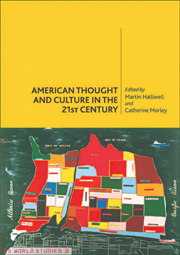Book contents
- Frontmatter
- Contents
- Acknowledgements
- Notes on the Contributors
- Introduction: The Next American Century?
- PART 1 POLITICS
- 1 American Politics in the 1990s and 2000s
- 2 American Leadership into the New Century
- 3 9/11 and US Foreign Policy
- 4 Three Variations on American Liberalism
- 5 The Rise of Postmodern Conservatism
- 6 US Propaganda
- PART 2 SOCIETY
- PART 3 CULTURE
- Bibliography
- Index
3 - 9/11 and US Foreign Policy
from PART 1 - POLITICS
Published online by Cambridge University Press: 05 August 2013
- Frontmatter
- Contents
- Acknowledgements
- Notes on the Contributors
- Introduction: The Next American Century?
- PART 1 POLITICS
- 1 American Politics in the 1990s and 2000s
- 2 American Leadership into the New Century
- 3 9/11 and US Foreign Policy
- 4 Three Variations on American Liberalism
- 5 The Rise of Postmodern Conservatism
- 6 US Propaganda
- PART 2 SOCIETY
- PART 3 CULTURE
- Bibliography
- Index
Summary
For all the horror of that Tuesday and the fathomless pain and grief visited on countless families, 9/11 was an event that thus far does not represent a significant turning point in US diplomatic history or foreign policy. It was quickly superseded by other events unrelated to the causes of 9/11. Influential strategists within the Bush administration seized on the horror to gain assent from liberal Americans to move the country towards a war in Iraq that neoconservative strategists desired, but that many within the US, albeit with considerable liberal acquiescence, shunned because of the memories of Vietnam.
This chapter contends that the dominant reaction led by the Bush administration instantaneously broadened the context by falling back on old ideas associated with notions of victory and confrontation, with ideologies resulting from defeat in Vietnam, and with the Cold War inclination to think in dualistic terms. While the event was and is of immense importance in order to understand US foreign policy, one must also understand the ‘ideological system of the epoch in question’. As the French historian Fernand Braudel famously wrote:
I remember the night near Bahia when I was enveloped in a firework display of phosphorescent fireflies; their pale lights glowed, went out, shone again, all without piercing the night with any true illumination. So it is with events; beyond their glow, darkness prevails.
- Type
- Chapter
- Information
- American Thought and Culture in the 21st Century , pp. 49 - 64Publisher: Edinburgh University PressPrint publication year: 2008



